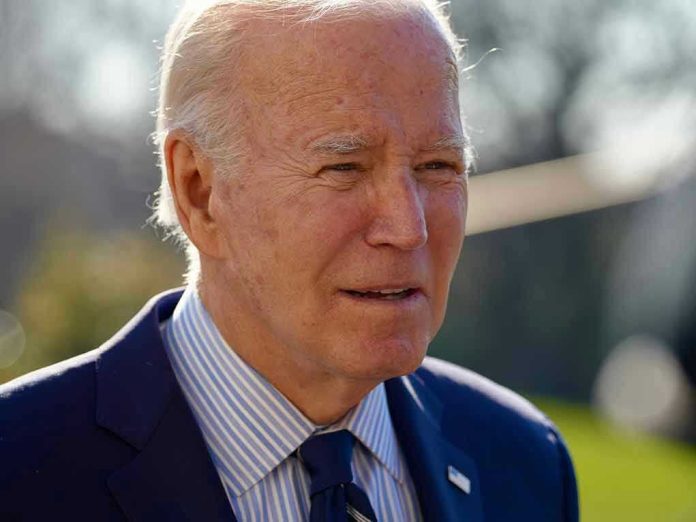
When a former president stands before the nation and warns of a “very, very dark moment” threatening America’s core freedoms, even the most skeptical listener feels the temperature drop in the room.
Story Snapshot
- Biden declares American democracy is facing an existential threat under Trump’s leadership.
- Free speech and media independence ignite national controversy after late-night hosts are targeted.
- Trump counters with economic messaging, intensifying the political divide.
- Experts debate whether the real crisis is authoritarianism or the economy.
Biden Sounds the Alarm: Democracy at a Crossroads
Joe Biden’s latest speech was more than a partisan broadside; it was a somber call to arms. On October 26, 2025, Biden painted a dire picture of the nation’s trajectory, arguing that Donald Trump’s administration is steering the country toward authoritarianism and stifling dissent. He urged citizens not to underestimate “dark days” ahead, warning that democratic institutions are at risk if vigilance lapses. For voters weary of political theater, the stakes have rarely sounded so personal.
Biden’s rhetoric comes after a firestorm in September 2025, when late-night talk show hosts like Jimmy Kimmel faced temporary suspensions for lampooning the Trump administration. The fallout from these incidents has fueled a national debate over free speech, with Biden positioning himself as a defender of open discourse. The former president’s warning resonates with those who recall past crackdowns on critics, but it also raises questions about the limits of executive power and the fragility of American norms.
Trump’s Strategy: Economic Optimism and Political Counterpunches
Donald Trump, now back in the Oval Office, has responded with his trademark bravado, dismissing Biden’s warnings as political theater and doubling down on economic issues. Trump’s messaging, amplified by his advisors and Treasury Secretary Scott Bessent, zeroes in on affordability, inflation, and the cost of living—issues that directly impact everyday Americans. The administration argues that economic success is the true measure of leadership, not rhetorical flourishes about democracy or freedom.
The White House’s strategy is clear: shift the national conversation away from accusations of authoritarianism and focus on tangible economic gains. Trump’s supporters view the current economic focus as a much-needed corrective after years of partisan gridlock, while critics warn that economic messaging cannot paper over deeper erosions of civil liberties. The back-and-forth between economic priorities and democratic safeguards shapes a political landscape where both sides claim the mantle of “saving America,” but define salvation in radically different terms.
The Media in the Crossfire: Free Speech and Political Retaliation
Media organizations and public figures now find themselves on the front lines of this conflict. The controversy surrounding the suspension of late-night comedians serves as a microcosm of a broader struggle over press independence and freedom of expression. Media watchdogs and advocacy groups warn that such incidents set dangerous precedents, potentially chilling criticism and undermining the role of the press as a check on power.
For many Americans, the battle over media freedom is not an abstract concern; it is a real-time test of the country’s commitment to open debate. The stakes are especially high as public trust in institutions continues to erode, with each new incident feeding suspicions about censorship and political retribution. The ongoing scrutiny of media independence underscores the delicate balance between holding power to account and navigating a politically charged environment.
What’s at Stake: The Future of American Democracy and the Economy
The clash between Biden and Trump is not just a contest of personalities; it is a struggle over the nation’s identity and priorities. Biden’s supporters argue that the greatest threat is the slow erosion of democratic norms and the creeping specter of authoritarianism. They warn that history is replete with examples of liberties lost not in a single dramatic moment, but through a series of incremental steps.
Trump’s backers counter that economic hardship poses an immediate threat to American families, and that strong leadership is required to restore prosperity. They view criticism of the president as politically motivated and see the focus on democracy as a distraction from bread-and-butter issues. This divide is reflected in public opinion, with polling data revealing deep polarization and little consensus on the way forward.
Expert Perspectives: Rhetoric, Reality, and the Road Ahead
Academic and professional observers offer sobering perspectives. Political scientists warn that the normalization of authoritarian rhetoric poses long-term risks to democratic institutions, while media experts stress the importance of defending free speech at all costs. Economic analysts, meanwhile, highlight persistent vulnerabilities in Trump’s economic strategy, particularly regarding inflation and affordability.
These competing narratives are not easily reconciled. As both Biden and Trump rally their bases, the rest of the country is left to grapple with uncertainty and division. Whether the primary threat is to democracy or the economy, the outcome of this contest will shape America’s future for years to come. The only certainty is that the debate is far from over—and that every American has a stake in its resolution.

